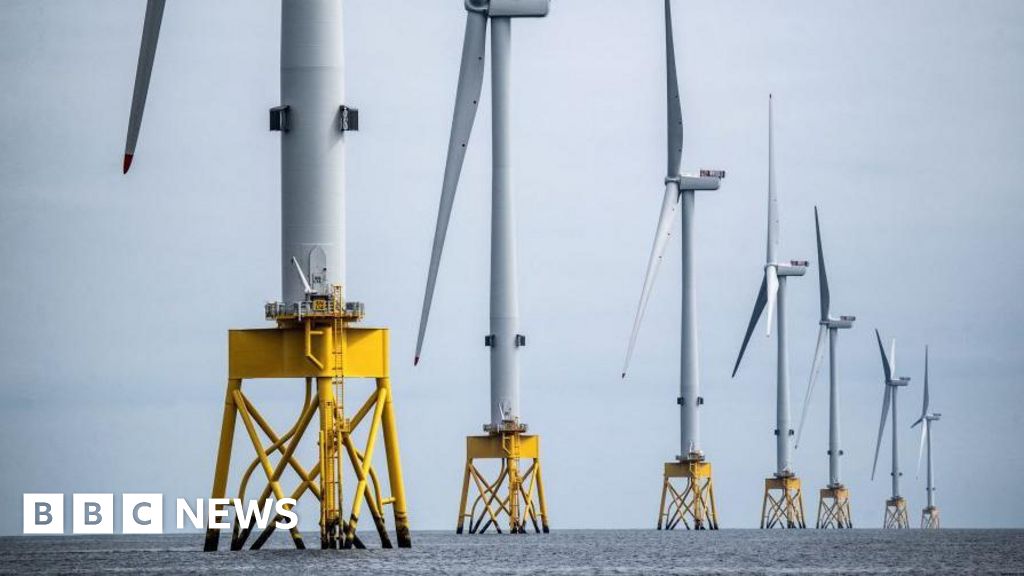Bussiness
Plans for Scotland’s first wind turbine factory at Leith docks – BBC News

Image source, Getty Images
A Danish manufacturer is seeking to build the first factory making wind turbine blades in Scotland, in a breakthrough for the renewable energy sector.
Vestas, a world-leading blade maker, has begun the process of securing planning permission for the site at Leith docks in Edinburgh – one of Scotland’s green freeports.
The company cautions that a final investment decision has not been made, and will require more certainty on orders by offshore wind developers.
Freeports are being given tax breaks to encourage investment and companies can now apply for these. Managers of the Leith site said it was “open for business”.
Vestas’ plan is expected to bring hundreds of high-skill jobs to the Edinburgh port.
It falls within one of several sites around the Firth of Forth designated as a “green freeport”, also including Grangemouth, Rosyth and Burntisland.
The Rosyth site has been expanded since the proposal was first lodged to include parts of its Royal Navy base.
The other green freeport in Scotland is around the Moray and Cromarty Firths, on sites including Invergordon, Nigg, Ardersier and Inverness docks.
As well as providing quayside space for the laydown and assembly of offshore wind installations, these sites are being developed for manufacturing.
Until now, much of the equipment has been imported. The next phase of Scottish offshore wind development is on condition that a higher proportion of the supply chain is in Scotland.
There are only two factories in Britain where blades are made for wind turbines – one on the Isle of Wight, run by Vestas, and the other in Hull, run by the German-Spanish joint venture Siemens Gamesa.
The plan for Leith would see it producing Vestas’ new design of offshore blade, known as B236, which will be 115 metres (377 ft) long.
A turbine with three such blades is rated at 15 megawatts, from which its average output would power roughly 13,000 homes.
Built mainly from composite fibreglass and resin, the process of manufacturing blades is highly-skilled, requiring several hundred workers to produce them at a viable scale.
Blades are a particularly valuable part of the supply chain for wind turbines, also including the steel towers, the jacket or base and the nascelle, or gearbox.
At least one other company, Mingyang Smart Energy, is in the planning and development process for building turbines in Scotland.
As it is based in China, that has raised concerns about vulnerability to trade and security tensions between Beijing and the UK.
Vestas and its planning agent lodged a Proposal of Application Notice on Friday, which was published yesterday, starting the planning process with City of Edinburgh Council. The firm intends to consult with the Leith community over summer.
A spokesman said: “The UK’s offshore wind sector has strong potential, and Vestas has identified the Port of Leith as a possible location for a wind turbine blade manufacturing facility.”
“A final investment decision has not been made and will be based on several factors including the viability of the business case and the market outlook.”
Vestas, which operates in more than 80 countries around the world, is seeking clarity on the flow of orders. These depend, in turn, on UK auctions which provide a guaranteed floor price for the power produced, as well as consents to link wind farms to the electricity grid.
The potential boom in supplying the offshore renewables industry also depends on the cost of capital, which has risen steeply, on unblocking bottlenecks in the planning process, and on other supplies, including subsea cables.
Forth Green Freeport says applications for investment tax breaks, starting from today, will have to comply with conditions on employment and environment standards.
Dame Susan Rice, chair of the consortium of landowners, said: “This is it. Forth Green Freeport is officially open for business. It is an important time for the Green Freeport as we move through the business case development phase to delivery for Scotland.
“Through innovations in offshore wind manufacturing, assembly and commissioning, alongside innovative shipbuilding, modular assembly and hydrogen manufacture, the country’s net zero targets can be boosted by Forth Green Freeport.
“This is a long-term project and one which we know will deliver real benefits to the local communities through economic growth, skills re-training and training and access to high quality, green jobs.”





